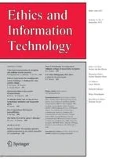Abstract
This paper deals with forms of communication aiming at a better informed public or publics. The main idea is that democratic societies are dependent on toleration of a plurality of publics, and simultaneously there is a need for communication between the different publics. The ethos underlying this assumption is that democracy requires a transcendence of subjective conditions in order for the public(s) to gain legitimacy and recognition of opinions. Validity of opinions presupposes a public aspect that is available through communication. More specifically, the validity in question is obtained through its claim on universality – i.e. the transcendence of purely private subjective conditions. This kind of validity is found in reflective judgment or enlarged thinking, as displayed in Kant’s third critique. In the last part of the paper it is discussed how new information technologies and the internet may contribute positively to facilitate modes of communication that are associated with the particularity at work in reflective thinking. Storytelling technologies and virtual realities are of particular interest in envisaging how this might work.
Similar content being viewed by others
References
Bruce Ackerman, James Fishkin 2004 Deliberation Day. New Haven & London: Yale UP
Hannah Arendt. Crisis in Culture. In Between Past and Future: Eight Exercises in Political Thought. Meridian, New York, 1968.
Aristotle. The Art of Rhetoric, transl. with an Introduction and Notes by H.C. Lawson-Tancred. Penguin Classics, London, 2004.
Seyla Benhabib 1992 Situating the Self. Cambridge: Polity Press
Stephen Coleman and John Gøtze. Bowling Together: Online Public Engagement in Policy Deliberation. Hansard Society, 2001. Online at [bowlingtogether.net], 2001 (Downloaded October 2004).
John Dewey 1927 The Public and its Problems. Henry Holt & Co:NY
John Dryzek 2001 Deliberative Democracy and Beyond: Liberals, Critics, Contestations. Oxford: Oxford UP
James Fishkin. Voice of the People. Yale UP, 1997.
Jürgen Habermas 1984 The Theory of Communicative Action. Boston: Beacon Press
Jürgen Habermas 1990 Moral Consciousness and Communicative Ethics. Cambridge, Mass.: MIT Press
Jürgen Habermas 1996 Between Facts and Norms. Cambridge. Mass.: M.I.T. Press
Immanuel Kant. The Critique of Judgment, transl. J.M.␣Meredith. Clarendon, Oxford, 1952.
Immanuel Kant. An Answer to the Question: “What is Enlightenment?”, transl. H.B. Nisbet. In Hans Reiss, editor, Kant’s Political Writings. Cambridge UP, Cambridge, 1991.
John O’Neill 2002 The Rhetoric of Deliberation: Some problems in Kantian Theories of Deliberative Democracy. Res Publica 8, 249–268
Lena Lindgren. Bloggekrigersken. Morgenbladet June 8–14, 2007.
Onora O’Neill 1989 Constructions of Reason. Explorations of Kant’s Practical Philosophy. Cambridge: Cambridge UP
William Regh 1997 Reason and Rhetoric in Habermas’ Theory of Argumentation. In Walter Jost, Michael M. Hide (editors) Rhetoric and Hermeneutics in Our Time. New Haven/London: Yale UP
Iris Marion Young. Inclusive Political Communication: Greetings, Rhetoric and Storytelling in the Context of Political Argument. Paper presented at the Annual Meeting of the American Political Science Association, Boston, 1998.
Iris Marion Young 2000 Inclusion and Democracy. Oxford: Oxford UP
Websites
The Center for Deliberative Democracy http://cdd.stanford.edu/
Robert Cavaliers homepage http://www.hss.cmu.edu/philosophy/faculty-cavalier.php
Public Informed Citizen Online Assembly – the PICOLA project http://caae.phil.cmu.edu/picola/index.html
Author information
Authors and Affiliations
Corresponding author
Rights and permissions
About this article
Cite this article
Thorseth, M. Reflective judgment and enlarged thinking online. Ethics Inf Technol 10, 221–231 (2008). https://doi.org/10.1007/s10676-008-9166-6
Received:
Accepted:
Published:
Issue Date:
DOI: https://doi.org/10.1007/s10676-008-9166-6




